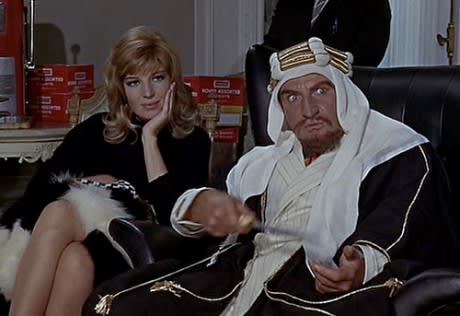Released in 1966, the adaptation of the Peter O'Donnell comic strip, Modesty Blaise, took the satire route to the existing template of mainstream cinema. Since the spy genre had become so ubiquitous at the time with the success of James Bond, these campy spoofs and genre hybrids were a dime-a-dozen, populating the mainstream lexicon with self-reflexive fluff to titillate broad notions of nostalgia and pop culture referencing.
Though the actual comic strip had a moderately serious tone, this loose adaptation took the route of kitsch—not unlike the majority of television-to-film adaptations in a modern context—by parodying Bond villains and adventures. Here, the titular Modesty Blaise (Monica Vitti) is recruited by British Intelligence to help thwart the plans of a diamond thief. But rather than develop an intricate plot involving conspiracies, her quest mostly involves smiling flirtatiously with her indebted ally Willie Garvin (Terence Stamp) when not evading, or engaging, the thieves, led by the eccentric Gabriel (Dirk Bogarde) and his serial killer partner, Mrs. Fothergill (Rossella Falk).
More interested in racial stereotypes—just wait until the Muslims pop up—and the many "shags" that Willie Garvin engages in than actual plot, Modesty plays out merely as a particularly campy time capsule in a modern context. There's nothing particularly appealing about the film and the pacing is sluggish at best, but the outfits and endless array of mid-'60s tchotchkes are intriguing and appealing on an aesthetic front.
In fact, it's the hyper-realized, pseudo-Sci-Fi set designs and dramatic props that attract the eye while the plot meanders listlessly, serving no real purpose beyond setting the stage for aesthetics. Although, said aesthetics routinely involve excess vaginal motifs and deliberately kaleidoscopic set design, which is a plus.
And even though director Joseph Losey was one of those targeted for Communist subversion in the '50s, there's really nothing here to suggest political motivation, beyond the vague assertion that greed is ultimately bad.
Still, as an example of the sort of throwaway nonsense coming out in the '60s, proving the broad, status quo reiteration and ungracious parody isn't something new or modern, Blaise is at least amusing in its clumsy, borderline incoherent, focus on style over substance. Also: it's weird seeing Terence Stamp as a young, shirtless slut.
Modesty Blaise screens at the TIFF Bell Lightbox as part of the Beyond Bond screening series at 9:15pm on Friday, November 30th.
(Fox)Though the actual comic strip had a moderately serious tone, this loose adaptation took the route of kitsch—not unlike the majority of television-to-film adaptations in a modern context—by parodying Bond villains and adventures. Here, the titular Modesty Blaise (Monica Vitti) is recruited by British Intelligence to help thwart the plans of a diamond thief. But rather than develop an intricate plot involving conspiracies, her quest mostly involves smiling flirtatiously with her indebted ally Willie Garvin (Terence Stamp) when not evading, or engaging, the thieves, led by the eccentric Gabriel (Dirk Bogarde) and his serial killer partner, Mrs. Fothergill (Rossella Falk).
More interested in racial stereotypes—just wait until the Muslims pop up—and the many "shags" that Willie Garvin engages in than actual plot, Modesty plays out merely as a particularly campy time capsule in a modern context. There's nothing particularly appealing about the film and the pacing is sluggish at best, but the outfits and endless array of mid-'60s tchotchkes are intriguing and appealing on an aesthetic front.
In fact, it's the hyper-realized, pseudo-Sci-Fi set designs and dramatic props that attract the eye while the plot meanders listlessly, serving no real purpose beyond setting the stage for aesthetics. Although, said aesthetics routinely involve excess vaginal motifs and deliberately kaleidoscopic set design, which is a plus.
And even though director Joseph Losey was one of those targeted for Communist subversion in the '50s, there's really nothing here to suggest political motivation, beyond the vague assertion that greed is ultimately bad.
Still, as an example of the sort of throwaway nonsense coming out in the '60s, proving the broad, status quo reiteration and ungracious parody isn't something new or modern, Blaise is at least amusing in its clumsy, borderline incoherent, focus on style over substance. Also: it's weird seeing Terence Stamp as a young, shirtless slut.
Modesty Blaise screens at the TIFF Bell Lightbox as part of the Beyond Bond screening series at 9:15pm on Friday, November 30th.
